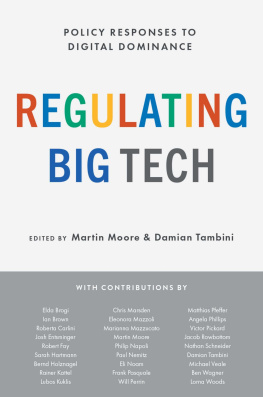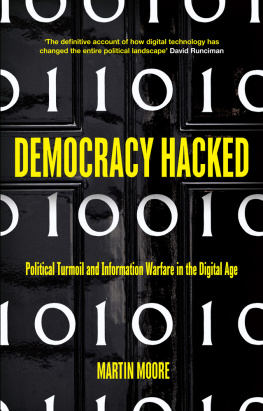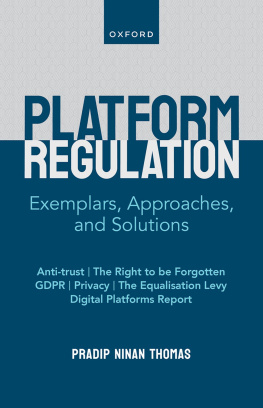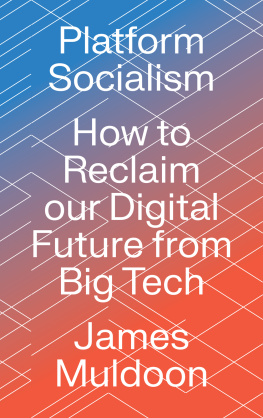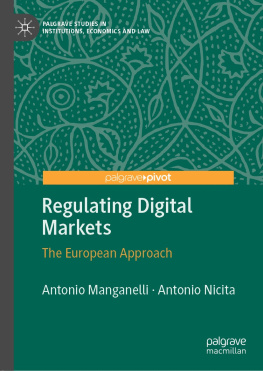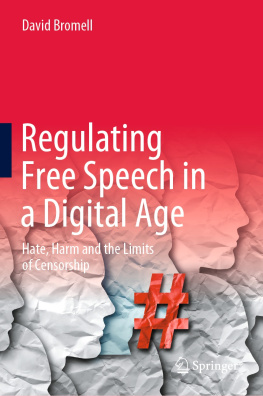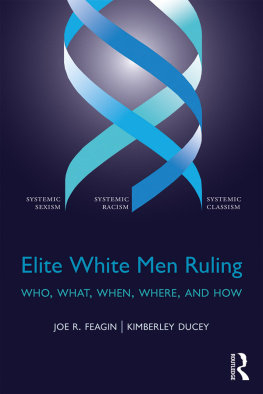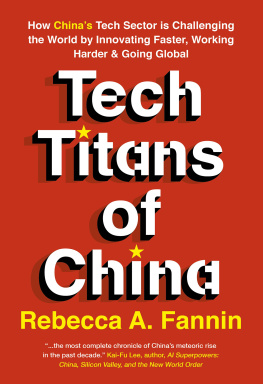Regulating Big Tech
Regulating Big Tech
Policy Responses to Digital Dominance
EDITED BY MARTIN MOORE
AND
DAMIAN TAMBINI


Oxford University Press is a department of the University of Oxford. It furthers the Universitys objective of excellence in research, scholarship, and education by publishing worldwide. Oxford is a registered trade mark of Oxford University Press in the UK and certain other countries.
Published in the United States of America by Oxford University Press
198 Madison Avenue, New York, NY 10016, United States of America.
Oxford University Press 2022

Some parts of this publication are available online as open access. Except where otherwise noted, the Introduction and . Enquiries concerning use outside the scope of the license terms should be sent to the Rights Department, Oxford University Press, at the above address.
All rights reserved. No part of this publication may be reproduced, stored in a retrieval system, or transmitted, in any form or by any means, without the prior permission in writing of Oxford University Press, or as expressly permitted by law, by license, or under terms agreed with the appropriate reproduction rights organization. Inquiries concerning reproduction outside the scope of the above should be sent to the Rights Department, Oxford University Press, at the address above.
You must not circulate this work in any other form and you must impose this same condition on any acquirer.
Library of Congress Cataloging-in-Publication Data
Names: Moore, Martin, author. | Tambini, Damian, author.
Title: Regulating Big Tech : policy responses to digital dominance /
Martin Moore and Damian Tambini.
Description: 1 Edition. | New York, NY : Oxford University Press, [2022] |
Includes bibliographical references and index.
Identifiers: LCCN 2021027068 (print) | LCCN 2021027069 (ebook) |
ISBN 9780197616109 (paperback) | ISBN 9780197616093 (hardback) |
ISBN 9780197616116 (updf) | ISBN 9780197616123 (epub) | ISBN 9780197616130 (oso)
Subjects: LCSH: High technology industriesGovernment policy.
Classification: LCC HC79.H53 M666 2022 (print) |
LCC HC79.H53 (ebook) | DDC 338.4/76205dc23
LC record available at https://lccn.loc.gov/2021027068
LC ebook record available at https://lccn.loc.gov/2021027069
DOI: 10.1093/oso/9780197616093.001.0001
Contents
Damian Tambini and Martin Moore
Mariana Mazzucato, Josh Entsminger, and Rainer Kattel
Sarah Hartmann and Bernd Holznagel
Eli M. Noam
Nathan Schneider
Lorna Woods and William Perrin
Angela Phillips and Eleonora Maria Mazzoli
Elda Brogi and Roberta Maria Carlini
Philip M. Napoli
Ben Wagner and Lubos Kuklis
Frank Pasquale
Chris Marsden, Ian Brown, and Michael Veale
Martin Moore
Jacob Rowbottom
Robert Fay
Paul Nemitz and Matthias Pfeffer
Damian Tambini
Victor Pickard
Martin Moore and Damian Tambini
Elda Brogi is a part-time Professor at the European University Institute (EUI) and holds a Ph.D. in Public Law and Constitutional Law (University La Sapienza, Rome). At the EUI she is Scientific coordinator of the Centre for Media Pluralism and Media Freedom. She is a member of the Executive Board of the European Digital Media Observatory (EDMO) and teaches Communication Law at the University of Florence. She is also a member of the Council of Europe (CoE) Committee of Experts on Media Environment and Reform (MSI-REF), co-rapporteur on the recommendation on electoral communication and media coverage of election campaigns. She was previously a member of the CoE MSI-MED and MSI-JO Committees.
Ian Brown is visiting CyberBRICS Professor at Fundao Getulio Vargas (FGV) Law School in Rio de Janeiro, and an ACM Distinguished Scientist. He was previously Principal Scientific Officer at the UK governments Department for Digital, Culture, Media and Sport; Professor of Information Security and Privacy at the University of Oxfords Internet Institute; and a Knowledge Exchange Fellow with the Commonwealth Secretariat and UK National Crime Agency. His books include Cybersecurity for Elections (2020, Commonwealth Secretariat, with Marsden/Lee/Veale), Regulating Code (2013, MIT Press, with Marsden), and Research Handbook on Governance of the Internet (ed., 2013, Edward Elgar).
Roberta Maria Carlini is research associate at Centre for Media Pluralism and Media Freedom (CMPF), at the Schuman Centre of the European University Institute, where she contributes to the Media Pluralism Monitor covering the Market Plurality area and realizes the Italian Country Report for the MPM project. Her research in the CMPF focuses on the media economy, external pluralism, and the impact of the digital platforms on the media industry. Roberta joined the CMPF in 2019, after a career as economic journalist in Italy. As a journalist, she covered economic, social and political topics for Italian leading newspapers, magazines and radio. As an essayist, she has written several books, most recently Come siamo cambiati. Gli italiani e la crisi (Laterza, 2015).
Josh Entsminger is a PhD student in innovation and public policy, supervised by Professor Mariana Mazzucato and Professor Rainer Kattel. In addition to doctoral work, he currently serves as a fellow at the Center for Policy and Competitiveness at Ecole Des Ponts Business School, and fellow at IE School of Global and Public Affairs Public Tech Lab. He was a research contributor on two World Economic Forum reports delivered at Davos in 2018 and 2020, concerning sustainable production systems and global technology governance. His writing and research can be found in Project Syndicate, MIT Tech Review Insights, WEF, RSA, The Conversation, The Decision Lab, and has been syndicated to over a dozen national newspapers in six languages.
Robert (Bob) Fay is the Managing Director of digital economy research and policy at CIGI. The research under his direction assesses and provides policy recommendations for the complex global governance issues arising from digital technologies. Prior to joining CIGI, Bob held several senior roles at the Bank of Canada, including as special assistant to Governor Mark Carney, serving as the Governors chief of staff. Bob was also an economist at the Organisation for Economic Co-operation and Development and worked on a wide range of economic and labour market issues.
Sarah Hartmann is an academic counsellor and senior research associate at the Institute for Information, Telecommunications and Media Law (ITM) at the University of Muenster, Germany. After studying law in Bremen, Paris and Muenster, she was awarded her doctorate in law for her dissertation on the material scope of the European AVMS directive and regulation in convergent media environments in 2018. Her research focuses on German and European media regulation, human rights and data protection law. She is currently working on her habilitation.
Bernd Holznagel is the Director of the Institute for Information, Telecommunications and Media Law at the University of Muenster, Germany, where he is a Professor for Constitutional Law, Administrative Law, European Law and Administrative Science since 1997. He studied law and sociology in Berlin and Montreal, Canada (McGill University). He received his Ph.D. at the University of Hamburg (1990) and published his habilitation on Broadcasting Law in Europe in 1996. His main research areas are the regulation of platforms and algorithms, data protection, telecommunications, media and internet law.

